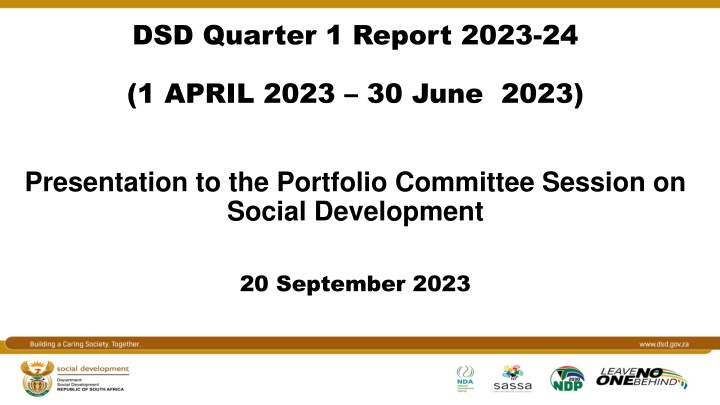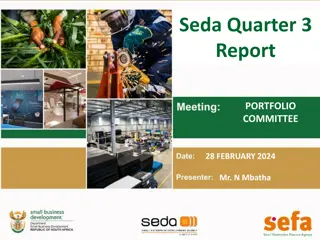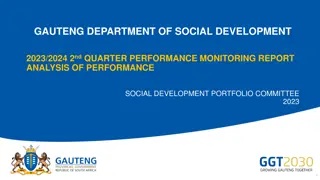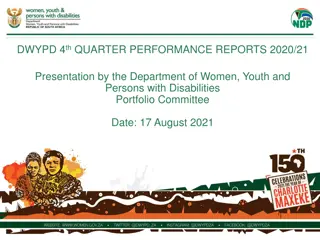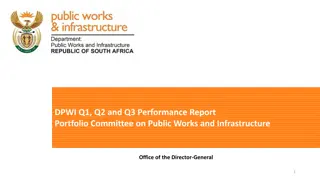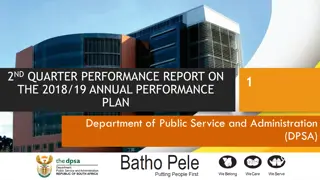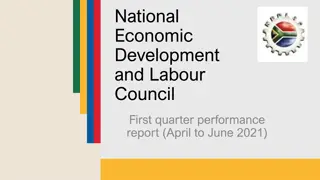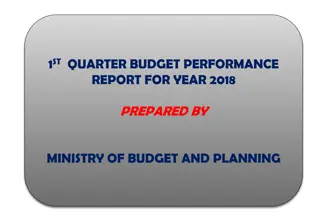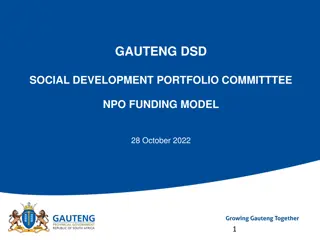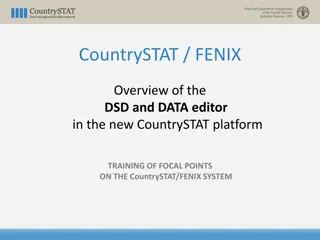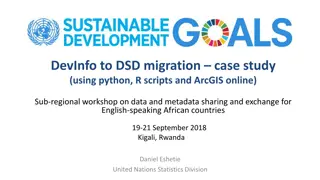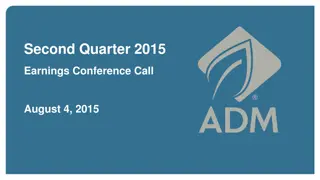DSD Quarter 1 Report 2023-24 Performance Overview
The Department of Social Development (DSD) presents its Quarter 1 Report for 2023-24, highlighting achievements, commitments, and challenges faced. They achieved 84% of set targets, with a focus on closing service delivery gaps and improving performance from previous years. The report also covers parliamentary processes and public hearings conducted on social development issues. DSD remains dedicated to serving the community and addressing critical needs despite challenges like load shedding and natural disasters.
Download Presentation

Please find below an Image/Link to download the presentation.
The content on the website is provided AS IS for your information and personal use only. It may not be sold, licensed, or shared on other websites without obtaining consent from the author.If you encounter any issues during the download, it is possible that the publisher has removed the file from their server.
You are allowed to download the files provided on this website for personal or commercial use, subject to the condition that they are used lawfully. All files are the property of their respective owners.
The content on the website is provided AS IS for your information and personal use only. It may not be sold, licensed, or shared on other websites without obtaining consent from the author.
E N D
Presentation Transcript
DSD Quarter 1 Report 2023-24 (1 APRIL 2023 30 June 2023) Presentation to the Portfolio Committee Session on Social Development 20 September 2023
Contextual analysis This is the 1st quarter performance against the objectives and Expenditure reports for the Department as committed to in the 2023-24 APP. In this APP 2023/24 we have given full attention to all the commitments that have lagged and the targets that have not been fully achieved previously, and we are dedicating the Financial Year 2023/24 as a year of consolidating the work of the 6th administration as well as intensifying efforts of closing all service delivery gaps. The Department achieved 84% of its set targets while 16% of the targets were not achieved, it is the highest achievement as compared to the 80% achievement of the previous year 2022/23. We continue to build from the lessons learnt in the previous reporting periods and we also continue to make efforts to improve from the areas that have been lagging in our previous year's performance and ensure that annual targets are achieved. Whist we are resolute in these endeavours, we equally take cognizance of the harsh realities and the dire state of our people who are dependent to our services for their livelihoods and so that they do not go to bed without food. We are also fully aware of the factors that make it difficult for us to deliver quality of service e.g., the country continues to experience severe episodes of loadshedding as well as some areas get affected by disasters due to floods and fire in some instances, as we recently observed in some buildings in Gauteng province. 2
Contextual analysis Parliamentary processes are underway and Public Hearings on the Older Persons Amendment Bill B11 of 2022 by the Portfolio Committee on Social Development have been conducted supported by the department in five provinces: Limpopo: 3 Districts (Vhembe, Mopani and Capricorn). Eastern Cape: 4 Districts (Chris Hani, Amathole, OR Tambo and Alfred Nzo). Kwa-Zulu Natal: 4 Districts (Ethekwini, Zululand, King Cetshwayo and Umkhanyakude). Mpumalanga: 3 Districts (Ehlanzeni, Gert Sibande and Nkangala). Gauteng: 3 Districts (Tshwane, Emfuleni and City of Johannesburg). Finally, DSD is continuing with hosting a series of public hearings on draft Policy on Social Development Services to Persons with Disabilities to solicit public comments. In this regard, DSD has partnered with the Provincial DSDs and their Districts to mobilize NGOs, DPOs, persons with disabilities. To date, 21 of the 28 Public hearings have already been conducted in 8 provinces. 3
Achievement of Targets per Programme : Quarter 1 of 2023 Achievement of Targets per Programme : Quarter 1 of 2023- -2024 2024 Programme No. of targets achieved No. of targets not achieved Total targets % Programme Performance 9 Programme 1 10 90% 1 0 1 1 Programme 2 0% 6 1 7 Programme 3 86% 12 4 16 Programme 4 75% 15 1 16 Programme 5 94% Total Targets 42 8 50 84% 4
Summary of Performance Quarter 1 of 2023/24 Overall DSD Programme Performance Trends April 2023 - June 2023 84% 100% 80% 16% 60% 40% 20% 0% Quarter 1: April 2023 - June 2023 Achieved Not achieved 5 5
Performance Overview: Targets Not Achieved While significant progress was made in the following areas, the set targets and objectives were not fully realised at the end of the first quarter: Human Capital Management: The quarterly target to submit a draft Sector Strategy for the Employment of Social Service Professionals to the SPCHD-DG Cluster for consideration was not achieved. The SPCHD-DG Cluster held on the 15 March 2023 advised the DSD to strengthen the Draft Sector Strategy for consideration. Subsequently, the draft Strategy was discussed for inputs at National Treasury (Medium Term Expenditure Committee (MTEC) and HSDS in April and June 2023 respectively. HSDS advised the DSD to host a workshop with four (4) DSD Provincial HOD (WC, KZN, NC, GP) to refine the strategy. National Treasury advised the DSD to embellish the strategy by including Service Delivery Model, trends analysis and data analysis, norms and standards and ratio for employment. Social Assistance: The quarterly target to transfer R63.25 billion to SASSA for administration and payment of social grants to beneficiaries on behalf of DSD was not achieved. A total of R 63,0 billion instead of R63,25 billion was made available to SASSA for the payment of social grants between April 2023 to June 2023. The targeted figure was based on estimated preliminary budget. However, the transfer was based on the final allocations from Treasury, which was received after APP has been approved. Nonetheless, all eligible grant beneficiaries were paid. Comprehensive Social Security: The quarterly target to request Cabinet approval for public comments on the draft policy paper was not achieved due to late submission of preliminary comments and inputs by government stakeholders. An input document on institutional framework and financial implications prepared. Escalation to Accounting Officers to enable the finalisation of the comments and inputs for the Cabinet memorandum to be processed. 6
Performance Overview: Targets Not Achieved Professional Social Services and Older Persons: The quarterly targets to consult the sector on the National Strategy on Ageing in four (4) provinces was not achieved due to other processes to be undertaken prior to the consultation. The target will be achieved in the next quarter. We have since managed to consult with Mpumalanga (28th&29th August 2023); Gauteng on the (11th & 12th September 2023) and we are in the North West (18th and 19th) Social Crime Prevention and Anti-Substance Abuse: The quarterly target to submit the draft Prevention of and Treatment for Substance Use Disorders Policy to Cabinet for gazetting and consultation was not achieved. This is due to further consultation conducted with National Treasury regarding the costing of the Policy. The target will be achieved in the next quarter. Poverty Alleviation, Sustainable Livelihoods and Food Security: The quarterly target to produce inception report on a design evaluation on linking social protection beneficiaries to sustainable livelihood opportunities was not achieved. There were delays in the appointment of the service provider to conduct a design evaluation. A project plan to expedite the process is in place and all efforts will be put to complete this report within the anticipated period. 7
Performance Overview: Targets Not Achieved Services to Persons with Disabilities The target to map out DSD to support independent living within the community for persons with disabilities was not achieved. There were delays in the finalisation of the appointment of a suitable expert to assist DSD to undertake this work. However, all plans are in place to expedite and complete this work within the timeframe. The target to conduct public hearings on draft Policy on Social Development Services to Persons with Disabilities in four (4) provinces was not achieved. Only three public hearing were held in GP (Johannesburg) and KZN (Ugu and iLembe Districts). Lack of accessible venue in FS (Sasolburg) and delays by DSD inspection team to view the venue for procurement in EC (Ngqheleni) resulted in the cancellation of the events. The public hearings have been rescheduled to take place in EC and FS in the next quarter. 8
Programme 1: Programme 1: Administration Administration 9
Entity Oversight OUTCOME: Functional, efficient and integrated sector Implement the Entity Governance and Oversight Framework ANNUAL TARGET/INTERVENTION: What we plan to develop/implement/reach Q1 TARGET/INTERVENTION: What we planned to develop/implement/reach ACHIEVEMENT What did we do? Quarterly implementation of the Entity Oversight Framework Two-days workshop with the Central Drug Authority was convened to develop plans for the Provincial Substance Abuse Forums (PSAFS). An interface meeting was held with the (SACSSP) to deal with the reclassification of the Council which is currently underway. IMPACT OF THE INTERVENTION: Engagements with the CDA clarified roles within CDA structures and contributed towards a positive collaboration between Provincial Subsistence Abuse Forums (PSAFS) and Departments at the provincial level. 10
Stakeholder Management and Donor Coordination OUTCOME: Functional, efficient and integrated sector Implement Stakeholder and Donor Management Strategy ANNUAL TARGET/INTERVENTION: What we plan to develop/implement/reach Q1 TARGET/INTERVENTION: What we planned to develop/implement/reach Host Stakeholder engagement session ACHIEVEMENT What did we do? A stakeholder engagement session was arranged and hosted on the 6 June 2023 in cape town. During the stakeholder engagement session there were facilitated panel discussion focusing on the banking sector, retail sector and corporate in general as well as developmental institutions. IMPACT OF THE INTERVENTION:To provide guidance on the management of donor coordination and stakeholders in the Department and ensure that donations dedicated to the Department are managed effectively, efficiently and in a way to optimize Social Development services in accordance with all strategic documents, regulations, procedures and policies. 11
Stakeholder Management and Donor Coordination OUTCOME: Functional, efficient and integrated sector Implement Stakeholder and Donor Management Strategy ANNUAL TARGET/INTERVENTION: What we plan to develop/implement/reach Q1 TARGET/INTERVENTION: What we planned to develop/implement/reach ACHIEVEMENT What did we do? Some of the outcomes of the panel discussions pointed out on the need to build a society that is not reliant on grants and the government to create jobs but be job creators themselves, there is a need for government to go to the people and implement the great policies and strategies that are in place, the need to innovatively mobilise social partners with the view to ensuring that issues of social and economic security becomes a societal responsibility IMPACT OF THE INTERVENTION:To provide guidance on the management of donor coordination and stakeholders in the Department and ensure that donations dedicated to the Department are managed effectively, efficiently and in a way to optimize Social Development services in accordance with all strategic documents, regulations, procedures and policies. 12
Monitoring and Evaluation OUTCOME: Functional, efficient and integrated sector Roll out the Electronic M&E System for Social Development in one (1) province ANNUAL TARGET/INTERVENTION: What we plan to develop/implement/reach Q1 TARGET/INTERVENTION: What we planned to develop/implement/reach ACHIEVEMENT What did we do? Develop pilot report Pilot report on the Electronic M&E System was completed Develop the Social Welfare Index ANNUAL TARGET/INTERVENTION: What we plan to develop/implement/reach Q1 TARGET/INTERVENTION: What we planned to develop/implement/reach ACHIEVEMENT What did we do? Draft concept document Draft concept document completed IMPACT OF THE INTERVENTION: 13
Finance OUTCOME: Functional, efficient and integrated sector Obtain Unqualified Audit opinion ANNUAL TARGET/INTERVENTION: What we plan to develop/implement/reach Q1 TARGET/INTERVENTION: What we planned to develop/implement/reach ACHIEVEMENT What did we do? AFS for the 2022/23 financial year submitted for audit The AFS for the 2022/23 financial year was submitted to the Auditor General of South Africa for auditing and to National Treasury for consolidation on 31 May 2023. IMPACT OF THE INTERVENTION: To obtain unqualified Audit opinion and reduce irregular, fruitless and wasteful expenditure in the Department and ensure compliance 14
Information Management Systems and Technology OUTCOME: Functional, efficient and integrated sector Implement NISPIS ANNUAL TARGET/INTERVENTION: What we plan to develop/implement/reach Q1 TARGET/INTERVENTION: What we planned to develop/implement/reach ACHIEVEMENT What did we do? DSD Social Development Integrated Case Management System (SDICMS) successfully configured and ready for NISPIS. Configure DSD s Social Development Integrated Case Management System (SDICMS) to be ready for NISPIS Hub. Integration with the Department of Home Affairs (DHA) on Personal Identification Protection (PIP). Successfully integrated with Department of Home Affairs (DHA) on Personal Identification Protection (PIP) IMPACT OF THE INTERVENTION: to have an integrated systems across the Sector Department 15
Legal Services OUTCOME: Functional, efficient and integrated sector ANNUAL TARGET/INTERVENTION: What we plan to develop/implement/reach Q1 TARGET/INTERVENTION: What we planned to develop/implement/reach Submit the Bill to Office of the Chief State Law Adviser for a preliminary opinion Submit the Draft SASSA Amendment Bill to Cabinet for approval to introduce the Bill to Parliament ACHIEVEMENT What did we do? Submitted the Bill to Office of the Chief State Law Advise preliminary certification not yet received pending response to comments made earlier during the last quarter of the previous financial year Submit the VSS Bill to Cabinet for approval to introduce to Parliament ACHIEVEMENT What did we do? Submitted to OCSLA, document shared with NEDLAC and more comments received from engagements with NEDLAC ANNUAL TARGET/INTERVENTION: What we plan to develop/implement/reach Q1 TARGET/INTERVENTION: What we planned to develop/implement/reach Submit to OCSLA for a preliminary opinion and incorporate comments from Office of the Chief State Law Adviser in the Bill 16
Legal Services OUTCOME: Functional, efficient and integrated sector Submit NDA Amendment Bill to Cabinet for approval to solicit public comments ANNUAL TARGET/INTERVENTION: What we plan to develop/implement/reach Q1 TARGET/INTERVENTION: What we planned to develop/implement/reach ACHIEVEMENT What did we do? Produce a refined Draft Bill Bill has been refined based on the turnaround strategy NDA developed IMPACT OF THE INTERVENTION: 17
Programme 2: Programme 2: Social Assistance Social Assistance 18
Social Assistance OUTCOME: Reduced levels of poverty, inequality, vulnerability and social ills ANNUAL TARGET/INTERVENTION: What we plan to develop/implement/reach Transfer R253 billion to SASSA for administration and payment of social grants to beneficiaries on behalf of DSD ACHIEVEMENT What did we do? A total of R63,0 billion was transferred for the 1st quarter of social grants between April 2023 to June 2023 with the monthly breakdown as follows: - Apr R20,9 b - May R21,0b - Jun R21,0b Q3 TARGET/INTERVENTION: What we planned to develop/implement/reach Transfer R63.25 billion administration and payment of social grants to beneficiaries on behalf of DSD to SASSA for IMPACT OF THE INTERVENTION: Provision of social grants reduces poverty and contributes to the reduction of income inequality in the country, and empirical evidence shows that CSG contributes to improved school attendance, educational attainment and access to food. Social grants proved to be the most effective mechanism available to government to cushion millions of the most vulnerable individuals and households from the dire socio-economic impact of COVID-19. 19
Programme 3: Social Security Programme 3: Social Security Policy and Administration Policy and Administration 20
Social Security Policy and Administration A number of policies and legislation are at different phases of development within Social Security. These policies and legislation are part of the targeted outcome to reduce levels of poverty, inequality, vulnerability and social ills. The policies include: Policy on Integrating Children s Grant Beneficiaries with Government Services. Conducted a desk-top review, refined, and validated a draft Policy on Integrating Children s Grant Beneficiaries with Government Services. A Policy Proposal on Income Support to 18-59 Year Olds. Conducted a desk-top review, refined, and validated a draft Policy on Income Support for 18 to 59-year-old 21
Social Security Policy and Administration A number of policies and legislation are at different phases of development within Social Security. These policies and legislation are part of the targeted outcome to reduce levels of poverty, inequality, vulnerability and social ills. The policies include: The Social Security Bill. Public consultation on the Green Paper pending. Therefore, no public comments received. However, a consolidated report with comments and inputs from consultative engagements with the technical expert panel was completed. The revised discussion paper submitted to the National Treasury. Draft Policy on Voluntary Cover for Retirement and Risk Benefits for Atypical and Informal Sector Workers. The Draft policy on Voluntary Cover for Retirement and Risk Benefits for Atypical and Informal Sector Workers and the initial SEIAS report submitted to DPME for assessment. First certification received. The Draft White Paper on Comprehensive Social Security A consultative workshop was held with government stakeholders on the revised green paper. Preliminary comments and inputs were received. 22
Social Security Policy and Administration IMPACT OF THE SOCIAL SECURITY POLICY INTERVENTIONS: Social Security Bill will improve the coverage and adequacy of social security benefits, while improving the responsiveness of the institutional framework to ensure universal coverage through coherent policymaking and equitable financing The Policy on linking Children grants beneficiaries will integrate social welfare services, education, and health within the cash transfer context, through improved access and cooperation, alongside economic support. The Maternal Support Policy will integrate the relevant systems from key departments such as DHA, DoH, DBE (ECD and Education), DSD, Employment and Labour, and SASSA. The linkage of pregnant women to comprehensive social protection package would further contribute to the ongoing development of synergistic linkages between services provided by the DSD and the rest of government. The Policy on Income Support to 18-59 Year Olds will expand the safety net to this vulnerable group whilst also ensuring improved targeting of government services that will assist in empowering social grant beneficiaries. 23
Social Security Policy and Administration OUTCOME: Reduced levels of poverty, inequality, vulnerability and social ills Social Security Review Volume 2 published ANNUAL TARGET/INTERVENTION: What we plan to develop/implement/reach TARGET/INTERVENTION: What we planned to develop/implement/reach ACHIEVEMENT What did we do? Manuscripts for Social Security Review Volume 2 submitted. Manuscripts submitted IMPACT OF THE INTERVENTION: The Social Assistance Appeals provide an effective, efficient and accessible social assistance appeals service for applicants and beneficiaries of social assistance. It provide access to their constitutional right to administrative justice by ensuring that the administrative decisions taken by the Agency (SASSA) in relation to their grant applications / reviews are timeously reviewed (by an Independent Tribunal) to ensure that it was lawful, reasonable and procedurally fair. 24
Programme 4: Programme 4: Welfare Services Policy Welfare Services Policy Development and Implementation Development and Implementation Support Support 25
Childrens Legislation and Families OUTCOME: Empowered, resilient individuals, families and sustainable communities ANNUAL TARGET/INTERVENTION: What we plan to develop/implement/reach TARGET/INTERVENTION: What we planned to develop/implement/reach Q1: 5% of the sector workforce capacitated on the Children s Act Capacitate 30% of the sector workforce on the Children s Act ACHIEVEMENT What did we do? Q1 Achievement: 15% (1 101 of 7 395) sector workforce capacitated on the Children s Act. The target was exceeded due to high turnover of participants during the virtual capacity building sessions. The target was exceeded due to high turnover of participants during the virtual capacity building sessions. In addition, there is strong collaboration and coordination efforts by different Directorates towards the achievement of this target. IMPACT OF THE INTERVENTION: The child protection sector workforce has been capacitated to ensure uniform implementation and interpretation of the Children Act as well as to facilitate compliance with the prescripts and requirements of the law to avoid unnecessary litigation. 26
Childrens Legislation and Families OUTCOME: Empowered, resilient individuals, families and sustainable communities Capacitate fourteen (14) districts on Teenage Parent Programme ANNUAL TARGET/INTERVENTION: What we plan to develop/implement/reach TARGET/INTERVENTION: What we planned to develop/implement/reach ACHIEVEMENT What did we do? Q1: Capacitate stakeholders on Teenage Parent Programme in two (2) districts Q1 Achievement: Stakeholders were capacitated on Teenage Parent Programme in two (2) districts namely, Lejweleputswa and Mangaung IMPACT OF THE INTERVENTION: The Sinovuyo Teens Parenting Programme seeks to improve caregiver- teen relationship through active social learning, improving caregiver mental health through social support and improving caregiver-teen communication about risky situations for teens in the community. The Tool assists to track the impact of the programme in provinces and identify gaps for further improvements. 27
CHILDRENS SERVICES INTERVENTIONS AND IMPACT OF THE CHILDREN S SERVICES A number of interventions were implemented as part of the DSD s obligation to take care of and protect children. These interventions included: Two provinces Eastern Cape and Northern Cape capacitated on Practice Guidelines for National and Intercountry Adoption. Capacitation of social workers to provide adoption services in order to ensure that the adoption services are accessible to even people who do not have means. Development of a quarterly report on the implementation of Guidelines for Community Based Prevention and Early Intervention Services to vulnerable children. The Tool assists in rendering uniform and standard services to orphans and vulnerable children (OVC), including Core Package of Services Guidelines Development of quarterly report on the implementation of the Intersectoral Protocol on Management of Violence Against Children, Child Abuse and exploitation. The quarterly monitoring report assists in measuring outcomes of interventions on the lives of beneficiaries; identify gaps and provide support to provinces where challenges are identified for children affected by violence, child abuse, neglect and exploitation. This further assist in to strengthen the identification, reporting, referral and effective case management in collaborative and coordinated manner. Development of a quarterly report on the implementation of the programme of action on foster care. The intended impact is to put in place the required systemic mechanisms in the provinces for the provision of foster care services, reducing the challenges that are currently experienced in the implementation of this service. The Report will assist with the following: To track the progress made regarding the implementation of the programme of action activities. To measure the degree to which the required systemic requirements are in place for the improved implementation of foster care services in provinces. To determine areas that require strengthening to achieve the objectives of the programme of action 28
HIV and AIDS OUTCOME: Empowered, resilient individuals, families and sustainable communities Capacitate ten (10) districts on Guidelines for Social Service Practitioners: Enabling Access to HIV Services ANNUAL TARGET/INTERVENTION: What we plan to develop/implement/reach TARGET/INTERVENTION: What we planned to develop/implement/reach ACHIEVEMENT What did we do? Q1: Capacitate two (2) districts on Guidelines for Social Service Practitioners: Enabling Access to HIV Services Q1 Achievement: A total of two (2) districts namely, uMgungundlovu and Eden Karoo were capacitated on Guidelines for Social Service Practitioners: Enabling Access to HIV Services IMPACT OF THE INTERVENTION: The capacity building of Social Service Practitioners enables mainstreaming of counselling, testing, treatment and adherence support for children and adolescents in particular. The PSS services that will be provided by trained SSPs contributes to the national Cheka Impilo Wellness Campaign, which encourages citizens to know their HIV status in order to access treatment. This intervention also contributes to the UNAIDS 90-90-90 strategy that encourages 90% of people at risk of HIV to test, of those tested, 90% to be on treatment, and 90% on treatment to be virally suppressed The outcomes of these interventions are in line with the need to ensure that individuals, families and communities are empowered and made resilient to deal with the scourge of HIV and AIDS. The psychosocial support programmes are meant to build competencies and capacities for these groups to cope with life demands and stresses and manage relationships well. 29
Professional Social Services and Older Persons OUTCOME: Functional, efficient and integrated sector Submit the Monitoring and Evaluation Framework for Social Service Professions Act, 1978 to HSDS for approval ACHIEVEMENT What did we do? ANNUAL TARGET/INTERVENTION: What we plan to develop/implement /reach TARGET/INTERVENTION: What we planned to develop/implement/reach Q1: Conduct consultation on draft Monitoring and Evaluation Framework Q1 Achievement: Conducted consultation on the draft Monitoring and Evaluation Framework IMPACT OF THE INTERVENTION: The Act seek to improve operational and governance efficiencies within the SACSSP in regulating Social service professions and social service practices as well as greater public trust and confidence in social service Professionals. TheMonitoring and Evaluation Framework will ensure the following: Accountability by DSD in managing implementation of the Act (budget and human resource allocation) Promotes accountability by SACSSP in terms of its obligations to comply with the Act and the PFMA 30
Social Crime Prevention and Anti-Substance Abuse A number of policies and legislation are being developed and implemented within Social Crime Prevention and Anti-Substance Abuse. These policies and legislation are part of the targeted outcome to reduce levels of poverty, inequality, vulnerability and social ills. These include: Development of a project plan in consultation with stakeholders for approval to implement the DSD Anti- Gang Strategy in 9 high risk districts A total of three (3) educational sessions on the DSD Anti-Gangsterism Strategy were conducted in high- risk districts namely, Chris Hani (EC), Ehlanzeni (MP) and Pixley Ka Seme (NC) Education and awareness campaigns were conducted through the provision of prevention and early intervention measures to curb social ills in twelve (12) campuses namely: University of Pretoria (Ondersteport and Hatfield campuses) (GP); Buffalo City Campus (EC); University of Venda and University of Limpopo (LP); Gert Sibande TVET College (Sibanesetfu, Standerton Skills Academy and Standerton Campuses) (MP); Mangosuthu University of Technology, Durban University of Technology (Steve Biko and Ritson campuses) (KZN); University of Cape Town (WC). There was a demand for services from Institutions of Higher Learning A total of four (4) public treatment centres namely, JB Marks and Taung (NW); Northern Cape (NC) and Seshego (LP) were monitored on the implementation of UTC 31
Social Crime Prevention and Anti-Substance Abuse IMPACT OF THE SOCIAL CRIME PREVENTION AND ANTI-SUBSTANCE ABUSE POLICY INTERVENTIONS: The Anti-Gangsterism Strategy aims to prevent Gangsterism in Child and Youth Care Centres (CYCC) and promotes welfare and safety of children from any child/ children who come with Gangsterism influences. The Implementation of Universal Treatment Curriculum programme will strengthen the provision of evidence-based treatment modalities and application of treatment tools for Substance Use Disorders in relation to treatment, care, rehabilitation, recovery and support. The UTC ensures uniform and improved quality of treatment services by standardising treatment programmes in public substance abuse treatment centres. The education and awareness campaigns provision of prevention and early intervention measures is designed and implemented with anticipated outcomes for curbing social-ills, empowering children and youth on a comprehensive knowledge on crime prevention related matters at an early stage for future benefits, raising awareness on crime prevention with the focus on educating children and youth in institutions of learning on measures to prevent being either victims or perpetrators of crime and violence, promoting an increased and equitable access of services, blowing the whistle and alert on the social-ills that are opportunistic and contributing to the committal of criminal and violent activities. The provision services especially to the vulnerable children and youth in institutions of higher learning and colleges responds to the priorities of government, especially, social cohesion and safe communities and economic transformation and job creation 32
Services to Persons with Disabilities OUTCOME: Empowered, resilient individuals, families and Sustainable communities Capacitate two (2) provinces on the Guidelines on Respite Care Services for Families of Children and Persons with Disabilities ANNUAL TARGET/INTERVENTION: What we plan to develop/implement/reach TARGET/INTERVENTION: What we planned to develop/implement/reach Q1:Development of respite care services models ACHIEVEMENT What did we do? Q1 Achievement: The Centre based and Home-based care models for Respite care services were developed following a number of consultations with the Parents and the working groups in Mpumalanga and Northern Cape provinces. IMPACT OF THE INTERVENTION: The Respite Care services aims to: Strengthening collaboration in three tiers of government , to maximize the use of existing resources Practical methodologies and approaches to empower parents of children with disabilities and improve accessibility of social service in communities. A sustainable community-based service delivery system to address marginalized children with disabilities and their families Improved quality of life of children with disabilities and their families towards living independently within their own communities. 33
Programme 5: Social Policy Programme 5: Social Policy and and Integrated Service Delivery Integrated Service Delivery 34
Social Policy OUTCOME: Reduced levels of poverty inequality, vulnerability and social ills ANNUAL TARGET/INTERVENTION: What we plan to develop/implement/reach Produce the Report on the State of the People of South Africa TARGET/INTERVENTION: What we planned to develop/implement/reach ACHIEVEMENT What did we do? Source data to inform report on the State of the People of South Africa IMPACT OF THE INTERVENTION:The report will provide an analysis of the State of the People in South Africa, to bridge a gap between Economy and Social. Attention is always given to the Budget (as presented by Treasuries) which is never juxtaposed or read alongside the State of the People. The report will use available secondary data as generated by different government departments, research institutions, the academia and other relevant stakeholders Sourced data to inform the update of the State of the People of South Africa report 35
Poverty Alleviation, Sustainable Livelihood and Food Security OUTCOME: Reduced levels of poverty inequality, vulnerability and social ills ANNUAL TARGET/INTERVENTION: What we plan to develop/implement/reach TARGET/INTERVENTION: What we planned develop/implement/reach Develop a quarterly report on the implementation of the National Food and Nutrition Security Plan ANNUAL TARGET/INTERVENTION: What we plan to develop/implement/reach Link five thousand (5 000) social protection beneficiaries to sustainable livelihood opportunities Develop an annual report on the implementation of the National Food and Nutrition Security Plan ACHIEVEMENT What did we do? Quarterly report on the implementation of the National Food and Nutrition Security Plan was developed Link thirty thousand 30 beneficiaries to sustainable livelihood opportunities A total of 14 007 social protection beneficiaries linked to sustainable livelihood Opportunities. Gauteng province, which has specific programme that link young people to the entrepreneurship and the skills development programmes to 000 social protection Because of IMPACT OF THE INTERVENTION: The Department continued with the provision of food to vulnerable individuals and households. The Food and Nutrition Security Programme contributes to the goal of improving access to diverse and affordable food. These interventions are part of the targeted outcome to reduce levels of poverty, inequality, vulnerability and social ills. 36
Community Development Practice and Community Mobilization The Department is developing policies and frameworks to ensure coherence and harmonization of the practice of community development across government, NGOs and the private sector. These include: The draft National Community Development Policy with inputs from the consultation process and the SPCHD Cluster has been consolidated. The Policy seeks to clarify roles of key stakeholders and institutional mechanism for effective and efficient delivery of community development services towards building vibrant, equitable, cohesive and sustainable communities. Three (3) Provinces (KZN,FS & WC) participating in the District Development Model have been monitored. Community Mobilisation and Empowerment Framework has been finalised. The Department capacitated five (5) Districts on the Community Mobilisation and Empowerment Framework towards the implementation of DDM (Dr Ruth Segomotsi Mompati and Bojanala Districts in North West Province, Thabo Mofutsanyane, Motheo and Lejweleputswa Districts in Free State Province).The Framework aims to assist in facilitating and addressing complex social issues that are experienced by communities; and provide community driven solutions that are required in transformative processes. 37
Youth Development OUTCOME: Reduced levels of poverty inequality, vulnerability and social ills ANNUAL TARGET/INTERVENTION: What we plan to develop/implement/reach Monitor implementation of DSD Youth Development Policy in all provinces TARGET/INTERVENTION: planned to develop/implement/reach Produce a monitoring report on the implementation of the DSD Youth Development Policy What we ACHIEVEMENT What did we do? Monitoring report on the implementation of the DSD Youth Development Policy has been produced IMPACT OF THE INTERVENTION: The Policy provides an opportunity to coordinate and develop youth development programmes and interventions that have a greater impact on the lives of young people and serves as a platform for the youth to contribute towards the National Development Plan Vision 2030. 38
Non-Profit Organisation Registration, Funding and Information Management The Department is developing policies and frameworks to regulate the NPO sector. These include: The Department is in a process to develop an NPO electronic system and the E-Learning platform for the DSD Sector Funding Policy. To this end The eLearning platform has been developed and the functional design specifications for the NPO electronic system were developed. The ultimate implementation of eLearning platform and NPO electronic system will contribute towards improving relations and efficiency in the funding and delivery of social services within the sector. The Department continues to register and monitor compliance of NPOs in line with the NPO Act. A total of 5 269 applications were received and 4 576 qualified registered processed, of those processed 4 576 (100%) were processes within two months. Similarly, a total of 14 902 reports, were received and 12 036 were processed. Of those processed 12 036 (80.8%) were processes within two months. These are part of the Departments efforts to strengthening civil society organisations in communities and improving its services for registering NPOs in terms of the NPO Act. 39
Q1 APPLICATIONS 5,400 5,269 5,200 5,000 4,800 4,576 4,600 4,400 4,200 Received Qualified registered within 2 months 40
Q1 REPORTS 16,000 14,902 14,000 12,036 12,036 12,000 10,000 8,000 6,000 4,000 2,000 0 Received Actual Processed Processed within 2 month 41
Summary of Expenditure Summary of Expenditure Quarter 1 Quarter 1 2023/24 2023/24 42
SUMMARY SUMMARY EXP END OF JUNE 2023 EXP END OF JUNE 2023 280,000,000 230,000,000 180,000,000 263,029,199 24.02% Spending 130,000,000 80,000,000 63,174,246 30,000,000 Voted 30-Jun-23 43
MONTHLY SPENDING MONTHLY SPENDING 22,235,582 21,187,362 20,874,140 22,500,000 21,500,000 20,500,000 19,500,000 18,500,000 17,500,000 16,500,000 15,500,000 14,500,000 13,500,000 12,500,000 Apr May June 44
SUMMARY EXPENDITURE 30 JUNE 2023 FINANCIAL STATUS FOR THE 2023/24 FINANCIAL YEAR Expenditure as at 30 June 2023 EXECUTIVE SUMMARY Voted 2023/24 Available Budget % Spent to date Programmes ADMINISTRATION SOCIAL ASSISTANCE SOCIAL SECURITY POLICY AND ADMINISTRATION WELFARE SERVICES POLICY DEVELOPMENT AND IMPL SUP SOCIAL POLICY AND INTEGRATED SERVICE DELIVERY Total Economic Classification Current Payments Compensation of employees Goods and services Transfer and subsidies Departmental agencies and accounts Foreign governments and international organisations Non-profit institutions Households Payment for capital assets Machinery and equipment Software and other intangible assets 426 595 105 318 60 893 263 1 968 249 48 348 159 068 63 174 246 321 277 24.69% 23.99% 24.34% 15.46% 43.99% 24.02% 253 841 777 8 086 459 312 773 361 595 263 029 199 192 948 514 6 118 210 264 425 202 527 199 854 953 929 497 513 773 415 724 196 633 130 595 66 038 62 977 416 2 084 117 732 864 383 178 349 686 21.15% 25.42% 15.89% 24.03% 25.44% 0.00% 0.00% 23.99% 0.96% 0.00% 18.62% 262 085 939 8 192 205 199 108 523 6 108 088 4 714 45 479 - - 4 714 45 479 253 843 541 13 763 13 054 60 893 299 192 950 242 13 631 13 054 132 - 709 132 65 577 -65 - Payment for Financial Assets 45 263 029 199 63 174 246 199 854 953 24.02% Total
OPERATIONAL SPENDING MAJOR TRANSFERS EXCLUDED 1000 000 20.69% Spending 900 000 951 566 800 000 700 000 600 000 500 000 400 000 196 866 300 000 200 000 100 000 - 2023 24 30-Jun-23 ENE
MONTHLY SPENDING Q1 Apr May June 43 989 43 430 43 178 28 767 19 972 17 297 R130 m R66 m Compensation Goods and Services 47
PROGRAMME SPENDING EXCLUDING MAJOR TRANSFERS ENE 30-Jun-23 426 595 24.69% 267 294 19.08% 18.09% 13.94% 141 479 105 318 116 198 48 348 26 998 16 202 P1 ADMIN P3 SOC SEC P4 WEL P5 INT
ECONOMIC CLASSIFICATION EXCLUDING MAJOR TRANSFERS ENE 30-Jun-23 513 773 415 724 25.42% 15.89% 0.43% 130 595 0.96% 66 038 36 8 306 13 763 132 COE G&S TRANSFERS CAPEX
EXPENDITURE ANALYSIS OF SPENDING EXPENDITURE ANALYSIS OF SPENDING P1: Administration 24% Spending The spending relate is mainly driven by mandatory services such as security and cleaning contracts, audit fee, fleet management and IT services. P3: Social Security Policy and Administration 13.9% spending Lower spending relate to slow start of projects as a result of inter-dependence on other institutions. The outreach activities have started and payments would reflect in quarter 2 and quarter 3 The projects for Appeals Posters and Zero rating of SRD Website have started. Payments would be initiated during the next quarters. P4: Welfare Services Policy Development and Implementation Support 18.1% spending Low spending is mainly attributed by historic spending for the community outreach programmes in the latter part of the financial year. Delays in the finalisation of contract for the GBV command centre and subsequent invoicing contributed to the low spending.
